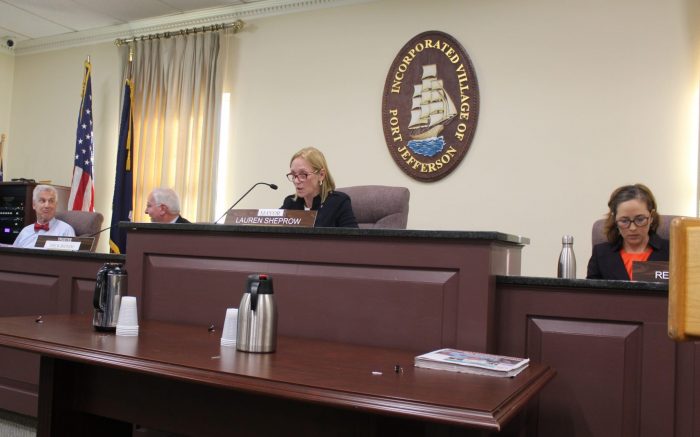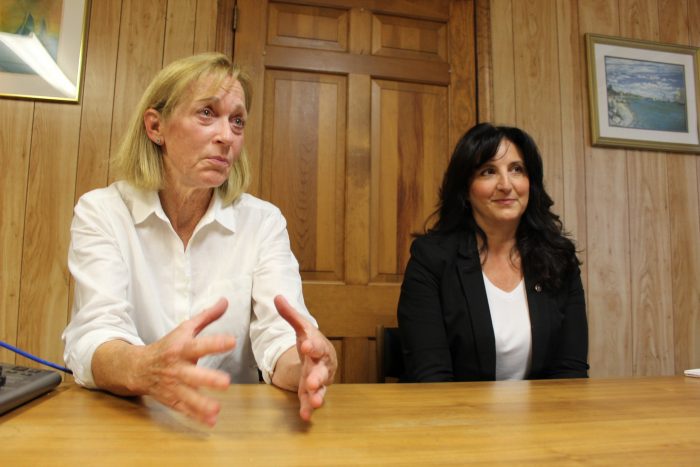By Aidan Johnson
Monday, July 10, marked Lauren Sheprow’s first Village of Port Jefferson Board of Trustees meeting as village mayor.
Sheprow led the new board through their business and reorganization meeting, in which the reconfigured village board voted to reject proposed code changes slated for the Maryhaven Center of Hope property on Myrtle Avenue.

Maryhaven Center of Hope
The proposed code amendments were an effort by the previous administration to preserve the historic building on the Maryhaven site. [See story, “For Maryhaven, Port Jeff village board weighs historic preservation, density and conservation,” April 29, TBR News Media website.]
It would have created a special permit application to allow the village board to designate specific parcels that contribute to Port Jefferson’s architectural and aesthetic character.
If approved, an applicant meeting these criteria would have qualified for relaxed standards for land use, allowing for additional height and stories without additional clearing.
During the public comment period Monday night, former village trustee Barbara Ransome addressed the continuing concerns over the property.
“I’m hoping that there are no quick decisions about changing codes for potential developers,” she said. “I think we heard at the [May 1] public hearing a lot of concern about the infrastructure, about losing a wonderful area that people feel is just going to be too crowded with that kind of density.”

Reorganization
But not all went smoothly at Village Hall.
Trustee Stan Loucks, who ran in this year’s village election alongside mayoral candidate Kathianne Snaden, left directly after the board’s reorganization meeting, skipping the general meeting altogether after Sheprow revealed he would no longer serve as liaison to the Port Jefferson Country Club.
“I feel very strongly that I’ve had an impact on the resurgence of the country club,” Loucks said. He went on to say that he did not think he could “work any further with this board.”
Village clerk Barbara Sakovich will leave the village government after more than 13 years in that role. Her retirement will take effect July 19. The trustees expressed their gratitude for her years of service. Silvia Pirillo will take over as the new clerk.
Sheprow appointed trustee Rebecca Kassay as deputy mayor and commissioner of environmental stability.
“It is an honor to step into the position of deputy mayor because it helps me better serve the village and work [especially with] flood resilience and climate studies,” Kassay said in an interview after the meeting.
“I’ve been talking to organizations like [the United States Geological Survey], and having the title of deputy mayor shows that the village is taking these climate resilience issues very seriously,” she noted. “I’m very glad to be representing the village in this way.”
Trustee Bob Juliano will serve as commissioner of public works and parks. Loucks was appointed commissioner of recreation, and newly appointed trustee Drew Biondo will be commissioner of buildings and communications.
Harry Faulknor will continue as the Port Jefferson Harbor commissioner.
Sheprow will serve as commissioner of finance and public safety/court/code.
A motion to appoint Donald Pearce as village treasurer failed — he held the post previously before resigning in 2015. Juliano suggested that while Pearce is excellent to work with, he was displeased that Denise Mordente was not reappointed.

Public safety
The general meeting started with a brief presentation from Code Enforcement Bureau chief Andy Owen and chief of patrol James Murdocco.
Owen clarified that the code department does not save and store private information through its automatic license plate readers, which are used to identify if a car has a valid Port Jefferson parking permit or a meter is paid.
He also announced that foot patrols downtown would begin after this weekend’s Port Paws Dog Festival. Owen said he is also planning on starting a bike patrol unit.
In June, 60 incident reports were written, consisting of noise complaints, traffic conditions and public disturbances.
A total of 206 summonses were written in June for incidents such as uninspected vehicles, missing license plates, parking without a permit or overtime meter parking.
Murdocco reported there have been over 200 incidents at the Port Jefferson train station since January, with many happening after 9 p.m.
Murdocco also announced the start of an informational Facebook page for the code bureau.
Public comment
During the public comment portion, held before the trustee reports, multiple residents voiced concerns about the potential overdevelopment of the park at Roosevelt Avenue. Myrna Gordon, along with other residents, suggested these developments would not be conducive to the area’s quiet character.
Sheprow announced a planned Parks and Rec Advisory Council meeting on July 26. All residents of the Roosevelt Avenue area are invited.
Michael Mart also touched upon the issue of transient housing — such as Airbnb facilities — in Port Jefferson, expressing a desire for the board to limit the rental time of a house to 30 days per renter.
After a resident asked how villagers could get involved with the different committees and task forces, Kassay said they are currently working on an online forum where residents could enter their information and the committees on which they would like to participate.
Reports
Juliano announced he would be starting office hours and that his door was always open. He also said that he gave the interim attorney a proposed code change so that when developers apply through the Industrial Development Agency for pilots or property tax exemptions, they would start at whatever they were paying now instead of at zero.
Biondo shared that he had toured a few of Port Jefferson’s facilities as the liaison to building and planning. He said he would discuss with the mayor and village attorney how they can streamline government processes.
Kassay said the Complete Streets and Walkability Plan is moving forward. She also said the board is still working on mitigating flooding challenges, though the problems cannot be eliminated. However, they are working on a study to see which areas need to be focused on for flood mitigation.
Kassay and Andrew Kelly, from Hauppauge-based VHB civil engineering company, are working on assisting grant writers with the documentation needed to apply to the New York State Environmental Protection Fund to progress to the next step for the planned Six Acre Park, which consists of taking a concept and making “show ready” plans for the park.
Sheprow announced she had appointed an ethics attorney to update the village’s ethics code. She also said that she has met with representatives from Stony Brook University’s Student Affairs office, and they have expressed interest in using Port Jefferson as a “living laboratory.”
The Board of Trustees also passed a resolution to create a budget and finance committee, and has been working to recruit members of a short-term and long-term rental evaluation working group.
Sheprow added that the board is considering establishing a working group to advise on policies related to the Port Jefferson Power Station to explore declining public revenue and possible repowering.
The board will reconvene Monday, July 24, at 3:30 p.m.













